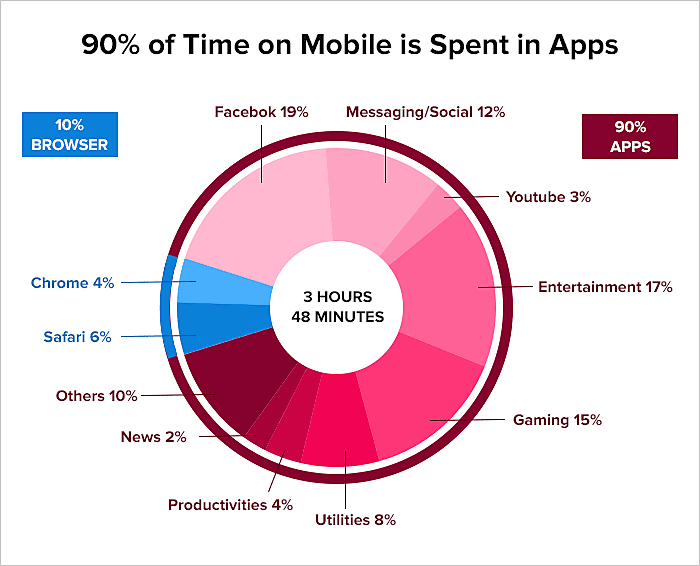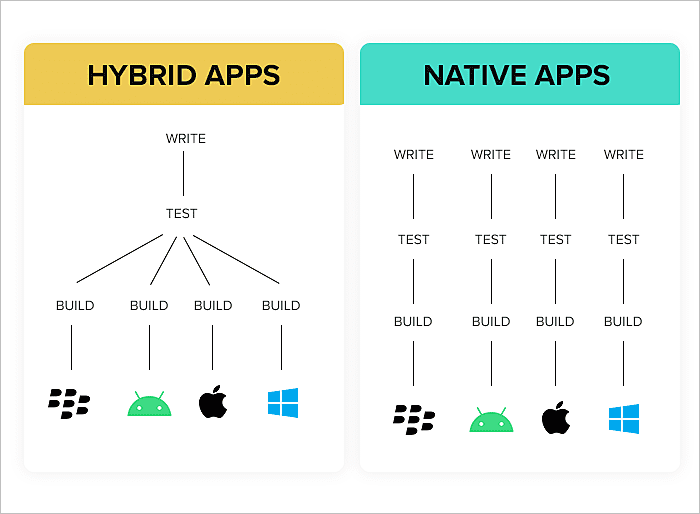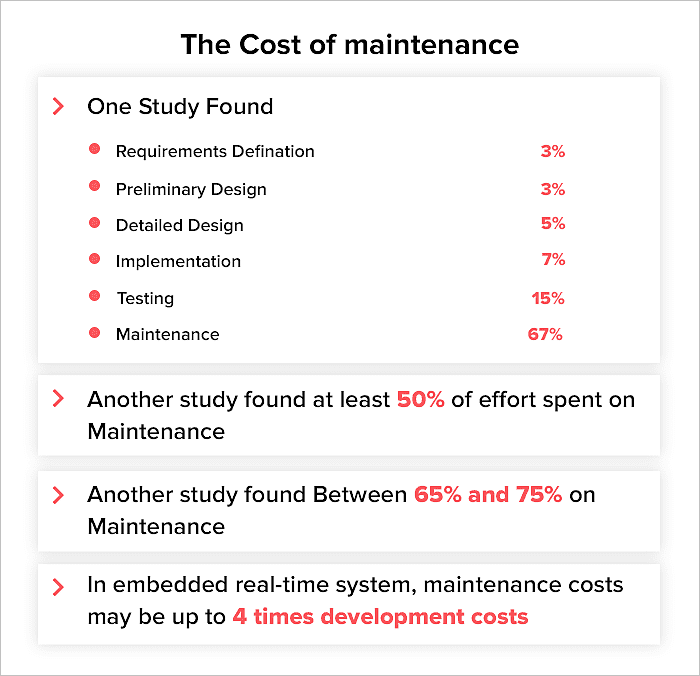
Nowadays Startups are highly dependent upon the mobile application for their success. For any business in its initial state, it is almost inevitable to skip the involvement of mobile app strategy in marketing plans.
In fact, the significance of mobile apps for e-commerce and other marketing purposes also increases owing to the fact that nearly 90% of the time that people spend on using smartphones is spent in apps as against the 10% of browsers. The statistics below explain the same.

But there is a big dilemma regarding the selection of the native and hybrid app. The new mobile application development trend of hybrid apps has changed the mobile industry aspects.
While there are many advantages of hybrid apps, native applications still hold some necessary functionality. The prominence of both native and hybrid apps have made it difficult for entrepreneurs to choose between these giant development methods.
Hence, to clear the clouds of doubt and assist you in making a firm decision, we have come up with a well-researched article that lets you understand the difference between both of them.
About Native vs Hybrid App Development?
The only difference between a hybrid app and the native app is in terms of their development methodologies.
What Is Hybrid App Development?
Hybrid application development is a process that does not require the developer to code in different languages for each platform. The developer just needs to use a universal code to build the app and can deploy the application on any platform including iOS, Android, and Windows. With the help of it, you can develop a cross-platform app to appease your diversified end-users.
Advantages of Hybrid App Development
Take a look at some of the top benefits involved with hybrid apps.
1. Better User Experience: Mobile app users today lay additional emphasis on the user experience of an app. In fact, following the right guidelines for developing an app UX is something that every developer pays additional attention to nowadays. However, with hybrid apps, users and developers certainly get the kind of enhanced UX they demand.
2. No Delays in Deployment: smartphone apps that are to be deployed on the app store require to be submitted first for approval on the app stores. It generally takes around 1 to 7 days for the approval of a new app or the update of an already existing app. However, there are no such delays with hybrid apps as the developers are free to bring in as many updates as they want without worrying about any delays.
3. Easy to Find Resources for Development: Finding the resources to build apps is much easier when compared to native apps. The reason is perhaps simple to understand. Hybrid apps are developed using programming languages like HTML, JavaScript, and CSS which are generally used by web developers. Hence, the same knowledge can be reused multiple times with ease.
4. Single Codebase: perhaps one of the biggest benefits of hybrid app development is the single codebase. Unlike native apps, hybrid apps don’t require developers to create a separate codebase and the same code can be used to develop apps for other platforms as well.
Disadvantages of Hybrid app Development
Take a look at some of the top cons involved with hybrid apps.
1. Limitations with User Interface: Hybrid apps have a user interface that isn’t as seamless when compared to native apps. Since these apps run on web view, the smartphone’s full potential cannot be used as much, which eventually leads to a poor UI. App developers try to use other means like open-source frameworks including react native for achieving a good UI for the app. The reason behind choosing react native is simple. They allow the app’s UI to look similar to JavaScript.
2. Failure to Explore Potential of a Platform: The biggest setback with hybrid apps is the failure to explore the full potential of the platform. Every platform, whether iOS or Android involves a set of unique features and functionalities which can be integrated into apps. However, when it comes to hybrid apps, this is only possible when additional plugins and codes of the platform are added. This leads to a delay in the whole app development process.
3. The Question of Security: Hybrid apps are generally said to be less secure than native apps. Complications like data-stealing or unreliable authentication can be serious concerns on hybrid apps.
Top Grossing Hybrid Apps Today
1. Instagram: One of the best and top examples of hybrid apps is Instagram. It is an app that is a perfect example of how innovation can be the name of the game with hybrid app development. The app allows users to access it even in offline mode and is currently one of the top-grossing apps in social media. In fact, Instagram today is the seventh most widely used social media app today.
The statistics below reveal the same.

2. Evernote: A great example of how productive hybrid apps can be, Evernote is one such app that is widely popular amongst worldwide users owing to its flawless interface and high level of productivity. The app allows users to take notes and record just about anything they want in real-time.
3. Netflix: A world-renowned app that is a go-to pic for web series fans around the world, Netflix is considered as an ideal example of hybrid apps by many users today. The popularity of the app has only surged over the years and continues to gain momentum with time.
Use Cases of Hybrid app Development
1. Ideal for Devices With Limited Hardware Functionality: Since hybrid apps are built using web language and wrapped with native codes to make them more cost-effective, they are ideal for devices that have limited hardware functionality.
2. Best in Case of Making the Content Accessible: Hybrid apps are best suited for specific purposes where the users interact less with the device and more with the content. Since apps with low device interaction but high web content availability can be used in many cases, hybrid apps become a feasible option in that case.
3. Cheaper Option: Since the development of hybrid apps is a cheaper option when compared to native app development, it is perfect for those enterprises that want a wider user reach but at a low cost.
What Is Native App Development?
A native mobile app is a type of app development that requires a developer to write a separate code (using different programming languages) for each OS to make the app compatible with each mobile device.
Now to understand which is better and should be preferred over the other, a couple of factors need to be taken into account.
Advantages of Native App Development
Take a look at some of the top pros involved with native app development.
1. Better User Interface: Native apps are generally renowned for their innovative UI. An interactive UI helps users to understand the navigation within the app much better when compared to hybrid apps.
2. Enhanced Interaction with Hardware Functionalities: opting for native app development means there’s a better chance of utilizing some of the smartphone features for the app as well. Smartphone features like cameras and recorders can be integrated into native apps.
3. Better Performance: Native apps offer users much better performance and responsiveness when compared to hybrid apps. The reason is perhaps simple to understand. Native apps are built for specific platforms and are compiled using platforms’ core programming language and APIs which eventually leads to better performance.
4. Native Apps Are More Secure: One of the best things about native apps is their enhanced security. Since these apps have authentication processes and more enhanced data protection features, native apps are always a better pick. Not only this, but native apps offer additional opportunities for enhancing the security levels.
Disadvantages Of Native App Development
Take a look at some of the top cons involved with native app development.
1. Time Consuming Development Process: Native app development is a time taking process and takes about 40% more time in comparison to hybrid apps. Since these apps are built for specific platforms, creating separate codes takes a much longer time.
2. Expensive: Even though there are many ways of maximizing the budget for app development, Native app development still takes more investment when compared to hybrid app development. The reason is simple since native app development involves coding separately for each platform, which means the time taken to build an app increases to a great extent, and the more time is taken, the costlier it gets.
3. Risk Associated: There’s always a risk involved with native app development. Since native app development is a costly affair, there’s always a risk involved in an app failing in its user reach or not clearing the approval review of the app stores.
Top Grossing Native Apps Today
1. WhatsApp: Perhaps the most widely used social media app after Facebook and YouTube, WhatsApp is owned by Facebook and is a great example of a native application. The app has a different interface for both its iOS and Android version. One such difference is in the color scheme for dark mode. While the iOS version has a slightly darker version of the mode, the Android dark mode is lighter.
2. Google Now Launcher: Another example of a native app is the Google Now launcher. Exclusively available for Android users only, Google Now Launcher is one of the best Android launchers available today. It transforms the whole look of an Android device. With features like icon packs and interactive widgets and interface, the Google Now launcher is widely used by Android users around the world.
3. LastPass: This is one of those apps that users find the most interesting. The Lastpass is a password manager native app that allows users to store all their passwords and confidential information in one place with top of the line security. The app is user friendly but ensures the data stays safe.
Factors to Take Into Account For Native vs Hybrid App Development
Here’s our take on the crucial factors that determine whether to opt for native or hybrid app development for enterprises.
1. Frameworks for App Development
Whether it’s a case of hybrid or native, frameworks play an important role in the development of an app today. It is a library that provides a fundamental structure and assists heavily in the development of an app. Now here’s a thing, deciding whether to opt for native or hybrid mobile applications development depends on which framework you wish to work with. Have a look at the different frameworks used in hybrid apps or native app development.
A) Hybrid App Development Frameworks
- Ionic- one of the most widely used hybrid app development frameworks, Ionic is integrated with premium UI components and a top of the line library which is considered best by many for creating a PWA. The minimum requirements for Ionic are Android 4.1 and iOS 7.
- React Native- Officially released in 2015 for developing hybrid mobile apps, React Native is the future of hybrid apps. The framework offers maximum code reusability which leads to higher savings. With notable features like a single JS codebase, native modules, and components, it has steadily gained fame to become a go-to pick for various top react native developers and helps create innovative apps with much ease.
- Flutter- Owned by Google, Flutter has created a major hype over the years as developers around the world have embraced its rich library and widgets. It comes with Skia, a 2D rendering engine that helps create top of the line visuals and allows developers to create highly productive apps.
B) Native App Development Frameworks
- PhoneGap- Considered a go-to pick for developing Android native apps, PhoneGap features in some of the best native Android app development frameworks today. It allows developers to create innovative apps without the use of a command line. With a wide community and rich library, the framework is worth a try in many ways.
- Corona SDK- Corona SDK is an Android app development framework that is used to develop mobile games and apps. The framework is best known for its speedy development process and a wide range of plugins. Developers can call an API using the framework and develop apps in real quick time.
- Xamarin- A framework that works on a shared C# codebase, Xamarin is used for developing native apps for Android, iOS, and Windows. The framework is best for beginners as developers can get real-time support and instant OS update release through the framework.
2. Deciding Upon the Cost Factor
Developing hybrid mobile applications is cheaper than native applications as it requires coding once. While native app developers have to generate codes individually for every OS, there is no such hassle with hybrid applications as there is only one code which is required to develop all types of apps. Take a look at how that works.

Secondly, the development of hybrid apps saves time and cost for an organization. Almost 30% of the cost difference is seen among hybrid and native app development according to the recent mobile app development stats. In fact, as per an estimate by Forrester, Hybrid apps can save up to 75-80% cost for an organization in support and porting compared to native apps. These apps are ideal for the startup as they are in the struggling phase and just need to test the app model.
3. Time-Frame and Ease of Development
The amount of time that it takes to develop a native or hybrid application becomes a crucial factor in determining which approach is the best. While hybrid apps are fast to build, test, and deploy, native apps require more effort and time to build. The reason is perhaps simple to understand.
Hybrid apps can be developed and deployed for multiple platforms using a single codebase. Hence, they take almost half the time and effort for development. As for native apps, they require the developers to build and test two separate codebases for different OS platforms like Android and iOS which means double the effort and time of development.
4. Customer Experience As a Crucial Factor
The experience that a user has in using an app determines how successful an app would be. Besides, when it comes to native and hybrid apps, the offline feature plays a tremendous role in determining the go-to choice for enterprises, and here's why.
“As per a detailed report by McKinsey & Company, between 1.1 billion to 2.8 billion smartphone users around the world cannot get online through their mobile network due to insufficient mobile network coverage in their area.”
Considering such staggering figures in the age of 5G today, native apps certainly have a huge advantage over hybrid apps in this department as they can work seamlessly on offline mode. As for hybrid apps, there are still some major issues to be taken care of in making these applications fully compatible with functioning in offline mode.
5. Hassles of Maintaining the App
Today, understanding the cost behind the maintenance of an app is something that every developer needs to take into account if it's a question of keeping the app running. While the maintenance of native apps is a hassle, to say the least, hybrid apps win comfortably in this department, and here's why.
The maintenance of native apps requires a developer to analyze all the information, package all the changes in a new version, and deploy it on the app store. While in the case of hybrid apps, this can be done easily since maintaining mobile or hybrid web applications is much similar to maintaining a web page and can be done multiple times without any hassle. One of the main reasons why some top hybrid app developers opt for this approach, maintenance can be a breakthrough factor in keeping the app and business running.
Besides, as per a study, the cost of maintaining an app is almost 4 times higher than the cost of development. The statistic below portrays the same.

6. The Efficiency of Scaling
Scaling in app development refers to the ability of an app to handle the ever-growing number of users on it. Developers today face numerous scaling challenges while developing apps with real-time features. While scalability in a native app can be achieved by integrating it with advanced features and API for more enhanced performance, hybrid apps have no such hassles.
Since hybrid apps are built for cross-platform, it is easy to scale them on different operating devices and platforms. This makes the development process hassle-free as developers get the privilege of re-using the code without making any changes to the application.
7. Deciding Upon Security Concerns
In the ongoing race of hybrid app vs native app, security plays a key role and native apps edge slightly ahead in this department. One of the main reasons why any iOS or Android app development company would opt of native, these are apps that are built with the security features of the operating system itself and have to get the approval of the respective app stores before they are listed. Hence, enterprises can expect a good amount of security and safety of the app. In fact, native apps can get additional from the app stores they are listed on.
However, on the other hand, hybrid apps are said to be much less secure as compared to native apps due to ongoing issues like weak authentication process, insecure data storage, server vulnerabilities owing to weak server-side controls, and so on.
Native vs Hybrid Apps: What Should be Your Preferable Pick?
There is not any straightforward answer to this question as it all depends on app purpose. For a startup, it's better to have a native app and keep on iterating the functionalities as your target users demand the same. On the other hand, if your aim is to develop a lucrative yet budget-friendly app, opting for a hybrid app should always be the option.
However hybrid development inherits some flaws which need constant rework from the developer’s end in terms of the user interface. But the hybrid application has plenty of advantages that can outnumber these issues and make it the best methodology to choose for the app development.
In a Nutshell
Hybrid apps work for almost 99% of cases. Here, entrepreneurs need to spend less on development and testing their products. In short, hybrid app development is becoming the future of the app development world, however, it contains some flaws but it will be resolved soon.
But still, if you're planning to go for native, make sure that you make your app scalable so that future changes can be easily integrated with the app. This not only makes your app updated but also a functional one that users would love to explore.
Frequently Asked Questions
-
How do I know if my app is hybrid or native?
-
Is a native or hybrid app better?

Sr. Content Strategist
Meet Manish Chandra Srivastava, the Strategic Content Architect & Marketing Guru who turns brands into legends. Armed with a Masters in Mass Communication (2015-17), Manish has dazzled giants like Collegedunia, Embibe, and Archies. His work is spotlighted on Hackernoon, Gamasutra, and Elearning Industry.
Beyond the writer’s block, Manish is often found distracted by movies, video games, AI, and other such nerdy stuff. But the point remains, If you need your brand to shine, Manish is who you need.














